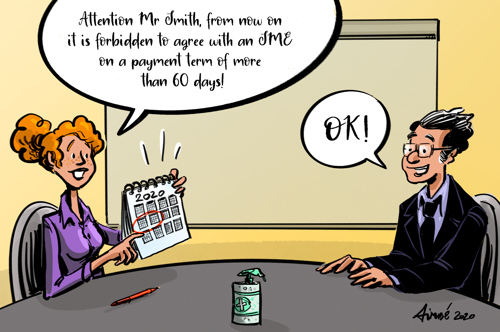From now on, it is forbidden to agree on a payment term of more than 60 days when the creditor is an SME and the debtor is not.
On 29 April 2020, the law amending the law of 2002 to combat late payment in commercial transactions entered into force.
Since 2002, any payment between enterprises must be made within 30 calendar days if the parties do not have an agreement or if the agreement does not specify a date or term for payment.
Despite this already fairly strict legislation, parties were still able to agree longer payment terms.
As a result, SMEs were often forced to enter into agreements with much longer payment terms because otherwise they would risk losing their client. Some SMEs had to comply with payment terms of more than 90 days, which could lead to serious cash flow problems.
The new law now provides a solution to this problem.
1. What does the new law provide for?
From 29 April 2020, no payment term longer than 60 days may be agreed if the creditor is an SME and the debtor is not.
Contractual clauses providing for a longer payment period will be deemed to be not written. In that case, the general rule applies that a maximum payment term of 30 days must be observed.
In addition, if an acceptance or control procedure is contractually provided for, the new law stipulates that the maximum period may not exceed 30 calendar days from the date of receipt of the goods or services.
2. To whom does this law apply?
This applies only to agreements between SMEs and non-SMEs. It does not apply in respect of payment terms between SMEs nor between companies that are not SMEs.
An SME is any enterprise which, at the time the commercial transaction is concluded, does not exceed more than one of the following criteria:
- an annual average of 50 employees;
- an annual turnover excluding VAT of € 9 million, and
- a balance sheet total of € 4.5 million.
This also includes freelancers, even if they do business as an "self-employed individual".


3. What about current agreements?
The law applies to all agreements concluded as from 29 April 2020.
SMEs that have been doing business with non-SME’s, large companies, for some time are advised to check whether they are bound by payment terms. For example, these may have been agreed upon in general terms and conditions of sale of the buyer being a large company to which the SME has agreed or in a specific agreement. In that case, it is an 'ongoing agreement' to which the new law does not apply. If a payment term of more than 60 days has been agreed, it will still apply.
However, as soon as the current general terms and conditions of sale or the specific agreement is amended for one reason or another, the new regulation must be taken into account. Depending on the market position of the SME, it may be appropriate to require the buyer to adapt the payment terms.
If a payment term of more than 60 days is provided for, the clause is deemed not to be written and the general rule being a maximum payment term of 30 days has to be respected.
4. Conclusion
In the context of a commercial transaction between an SME and a company not being an SME, there are only two possibilities:
- either the legal payment term of 30 calendar days applies (general rule);
- or a conventional payment term of up to 60 calendar days is provided for.
On the positive side, it is no longer possible for SMEs to agree on payment terms longer than 60 days.
Less positive is that this only applies to agreements concluded as from 29 April 2020 and not to current agreements. Nevertheless, it is still worth checking whether there is room for negotiation. It goes without saying that we can assist you in this respect.
It is always important to conclude clear agreements in the context of business relations and to check the general terms and conditions and agreements and adjust them if necessary. Finally, it is extremely important to ensure that future agreements take into account these new regulations.
Do not hesitate to contact us on +32 (0)2 747 40 07 or via info@seeds.law.








